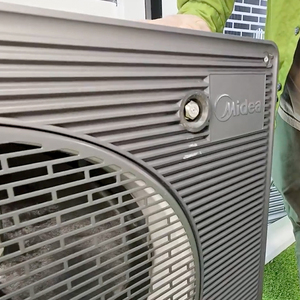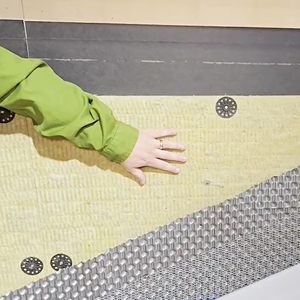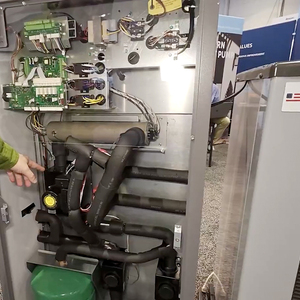What can a non-electrician do
Just wondering if the national electrical code details what tasks can be performed by a non-electrician and which require a licensed worker or if that is decided on a state by state basis. I’m aware that a homeowner can do alot of work in their own home and than have it inspected, I’m wondering what can be done by an contractor working for them? I see alot of these handyman types advertising that they install light fixtures, add outlets, etc.. is this legal for them to do?(I would never let some $15.00/hr handyman try to install a circuit at my house). I also know from working in commercial real estate that many property management companies have their employees changing ballasts in fluorescent fixtures and changing gfi outlets, is this legal? Any input or links to input would be appreciated.
Thanks
-Ray



















Replies
In my state, if you live in the house and do not plan on selling for two years, you can do anything on the owner side of the meter, with a permit of course.
By following the code to the letter, nothing is really hard, it can get confusing but really not that hard.
But this cannot be a rental house, place of business or anyplace where the public can attend. Cannot be your daughter house. the person who does the work must live in the house full time.
largely this is up to the AHJ (Authority Having Jurisdiction) in your area. Usually there is a local building or inspections department that enforce any rules decided on at the state or local level.
ray,
The National Electrical Code is silent on whos can legally work on building wiring, other than to say the it shold be a qualified individual--in essence, someone with the knowledge and training to do the work safely and correctly. State and local governments determine that.
In most places, it's legal for most anyone to do a direct replacement of a fixture, switch, or receptacle outlet. No permit needed.
When you get into modifying or adding to the building wiring, it varies. As mentioned above, if you own a single-family house and live in it, you're free to do any work you want, although a permit is required and some jurisdictions require the homeowner to pass a simple wiring knowledge test. And some jurisdictions strongly discourage DIY electrical. I had a client in the San Francisco Bay area who tried to pull a permit to add a subpanel in the garge, and the city bldg dept charged him double the permit fee, because they said they were sure that the inspector would have to make two trips (because DIYs never got it right the first time).
If someone contracts to do electrical work, in many states they have to be a licensed electrical contractor. In California, it is illegal to do electrical work (as a specialty contractor) with a value of over $500 without being a licensed electrical contractor. This requires 4 years of FT experience in the trade and passing a comprehensive exam on contract law/business and on the trade, and then posting a bond. It's interesting that a licensed general contractor (or an employee of a GC) can do any electrical work w/o being either a licensed electrical contractor or electrician!
In other areas, anyone who pays a nominal fee can become licensed and do electrical work. In some areas, no license is required at all, and there are no inspections.
If the person doing the work is on the building owners payroll (an employee), in some places they have to be a licensed electrician. In California, the state is beginning to head towards licensing electricians. In others, any goober on the payroll can work on the wirig of his employers buildings. I don't mean to imply that a maintenance man can't correctly change a ballast. But some maintenance guys don't have a clue about safe wiring, and yet they do quite a bit of electrical work.
But it all depends on where you are. I have heard that in Cook County, Illinois (i.e., Chicago) it's illegal for even a resident homewoner to touch his homes electrical system. And I mean anything beyond replacing a lightbulb! Then you have areas like some in rural Montana where there are no building codes--how ahouse is built is completely up to the builder/homeowner and whether they plan to insure the house (insurance companies prefer to insure houses that are built to meet building, plumbing, electrical Codes, etc).
Cliff
"I have heard that in Cook County, Illinois (i.e., Chicago) it's illegal for even a resident homewoner to touch his homes electrical system. And I mean anything beyond replacing a lightbulb!"
I grew up in Chicago and just recently moved away. Cook County has very strict electrical codes, one of the biggies being that everything must be conduit. Of course they still manage to sell Romex at the HD's in town, but I'm sure it must be people from out past the county limits coming to get materials.
Surely some of the strictness is from the fire, but I think more of it has to do with the unions. The El. union is strong around Chicago, and if you mandate conduit, most electrical jobs are beyond the reach of the DIY sparky.
Just my theory...
Jon Blakemore
And then throw in the mix, owner-builders; the electrical as such is only as good as the inspection (although that is questionable).
Hey, let's get hung up on three inches of clearance in front of a subpanel, but not even check to see if the electrical penetration(s) are properly sealed through a firewall. Part of my inspection experience.
The bottom line is that there are thorough homeowner/DIY'ers (and flakes too), maintenance people (and flakes too), and licensed electricians (and flakes too). Having the latter sign off on things or do the work is comforting, but it certainly is no guarantee.
On another note: Jon, I fail to see how wiring in conduit (I'm assuming mostly flex conduit) will prevent fire (i.e. I'm reading via miswiring) any more than Romex.
Right on, Jon.
Wiley, conduit won't do anything to stop a fire, it just makes it harder for the average joe schmoe to install it. That in turn leads to more union jobs. Let's face it, Romex is an extension cord.
I must say I am a huge fan of conduit (and glad to have a grandfather to teach me how to do it :-) ). Makes it awful easy to add wiring.
When people 100 years from now see my work, they'll know I cared. --Matt Mulka
Edited 10/28/2003 10:35:31 PM ET by Matt Mulka
Matt, I guess my point was that whether it is romex or conduit, the latter don't cause a fire; poor installation and on the other end, and appliance or whatever do. It ain't the material per se unless you have some documentation to discount the latter?
Plus, how does one justify "knob and tube" that is still in heaps of homes all over the US if one is so sold on conduit?
I'm just wondering what advocates of conduit think they are getting that is so far superior to romex, or "knob and tube" for that matter? I mean newspapers could be delivered with a Hummer door to door, but why is that necessary?
Actually, the city of Chicago requires conduit, most of the suburbs in Cook County do not. If you're fishing wires through walls, Chicago lets you use Greenfield for this.
The city requires all electrical work to be performed by an electrical contractor that is licensed by the city. Period. I was sitting in the waiting room at the building department once hearing an inspector explain this to a homeowner. The homeowner said he was going to demo some walls to change the plumbing but leave the electric intact. The inspector said he would obviously have to remove the cover plates to strip the d/w off and for that he would need an electrician. He was kind of being a jerk because this homeowner was very annoying, but that is the letter of the law in Chicago.
I don't know if the conduit requirement is driven by the unions or some other reason, but I'm glad it's there. It's pretty tough to poke a nail through a pipe. Anyway, why is romex not used in commercial work, but its ok for residential?
Matt,
Sure now, I misheard you--"conduit won't do anything to stop a fire"!
Seems obvious to me that metallic conduit (flex or thinwall) will contain the heat and sparks from an overloaded or shorted wire. And metallic conduit will spread the heat over a large area, making it less likely that something in contact with it or nearby will ignite. Whereas romex is just a fire waiting to happen--there's even some kindling (paper filler) in there as part of the cable! It's more prone to damage, and if anything goes wrong, well, the heat and sparks are right out there in the mix.
A friend of mine who lives in the foothills suffered a house fire--started in a bedroom wall. House is a few years old--not brand new, but modern wiring. Because there was someone home at the time and they noticed it right away, and thanks to a fast and effective response by his local fire dept, he only lost a room and the roof. The fire inspector's finding: point of origin was an outlet box where a rodent had chewed through the romex sheath and the wire insulation, causing an arcing short. The usual construction debris in the stud bay (sawdust) provided enough kindling to get things going. That would never have happened with metallic conduit.
In a couple of houses that I've re-wired for Habitat for Humanity, I've found several areas of romex with major rodent chewing--bare copper showing on the hot & the neutral. Wouldn't necessarily have resulted in a fire, but then again, it could have.
It's not just an inner city thing, having mice, rats, etc nibbling on the wires. Wire in "pipe" (even thinwall or flex) is protected from this. And wire in pipe isn't gonna get caught in a truss scissor or get cut by a truss nail plate if the installer was a bit sloppy or the cable gets moved later by someone crawling in the attic.
I'm rewiring my place--built in 1940 with well-crafted knob& tube--with MC cable. A bit of a challenge fishing the stuff, but my place has a mostly walkable attic and a quarter basement with the balance a crawlspace that's tight in spots (18"). But hey, it builds character.
Cliff
Cliff, I'm wondering with the advent of AFCI's nowadays, which I'm not sure if they are in the new Code as I am under juristiction of an older/former Code, if that isn't designed to combat the exact thing you outlined with the rodent et al issue(s), and to be another source of insurance/safety replacing even a consideration of using flex/metal conduit more predominantly? I gotta imagine electricians wiring for residential would never want to go back to flex conduit as a way of daily installation life, save of course for those licensed electrical contractors doing their own houses. <g>
Yea, most of the rural folks in my neck of the woods have wired their own barns and outbuildings, and used NM (Ronex). I think they're nuts. These are buildings chock full of highly flammable material and often contain well-loved & valuable livestock (horses, etc.) . They also have alot of rodents. Not the type of place you want to have alot of plastic-covered cable.
EMT is very cheap if you're doing the labor yourself. All you need to do is get an extra bundle of conduit and an EMT bender, and do some practicing.
Metallic conduit will not only contain a fire, it also increases the chances that a breaker will trip should insulation on a wire be damaged.
Cliff,
Now that I've thought about it more conduit will do a MUCH better job than romex, especially in regards to tripping the breaker and containing the heat. (Wow, someone who wrote an article in FHB responded to me!!!) I don't know where my brain was. I was thinking more along the lines of something like a toaster overheating or something like that.
Like was mentioned (and as I should have mentioned) Romex is very easy for a rodent to chew through. And once the walls are in place, it's very difficult to change things, as Cliff knows. With conduit you can rewire a house without tearing up one wall.
Plus, how does one justify "knob and tube" that is still in heaps of homes all over the US if one is so sold on conduit?
Wiley my response to that is that k and t is not justified, it's imperative to keep proper clearance from combusitbles and extremely susceptible to rodents. Quite frankly, it should be replaced. As a response, how does one justify all the lead pipes under the streets of chicago STILL SERVING PEOPLE TO THIS DAY. Yep, residents of chicago drink water from lead pipes. Shouldn't those be replaced?? Just a thought.
BTW Cliff, you and I oughta get along well, we both volunteer for Habitat.
When people 100 years from now see my work, they'll know I cared. --Matt Mulka
Matt,
So you're a HfH volunteer--alright! I like the tag line. When I see real old work--high quality work that's been done by guys who are long gone--I give thought to how the world was back then. And I appreciate their dedication to the craft.
As for PUFFs and others thoughts about the permit system, yea, it is far from ideal. You have some licensed hacks who do poor work, and in some instances very capable DIY/homeowners are precluded from doing their own work legally. And some inspectors are conscienscious and capable but don't have the time to do a thorough job, or have to pull their punches due to political pressure. And some inspectors are incompetent bullies.
But if you've even been to Asia, South America, or Mexico, and seen their typical wiring systems, or heard about the carnage that occurs during an earthquake or building fire due to non-existant or totally non-enforced building codes (not just electrical), you may agree with me that our system of codes, pemits, and enforcement does have advantages.
And, yes PUFF, I've often wondered what influence Mrs. O'Leary's cow and lantern has had on the Chicago electrical Code! Not to mention the unions...For your info, in 1915, a house would have been wired with either K&T or BX, and receptacle outlets would be in metal boxes. Those old boxes were heavy gauge metal, half again as heavy as the ones we use today. A real gripe to cut out.
Wiley, right-on on all points. About the AFCI requirement, that was first in the 1999 NEC, (reqd for bedroom receptacle outlets, effective Jan 2000), and if I recall right, your city's electrical code is basically the 1996 version of the NEC. The AFCI requirement was modified in the 2002 NEC, BTW, to require AFCI for "bedroom outlets", which includes all outlets--lighting outlets (including smoke alarms) and receptacle outlets. Big difference. And the AFCI was designed for exactly the issue you mentioned--certain types of arc faults. With luck, the AFCI will be improved and the price will come down.
Un Svakatos (To your health),
Cliff
Quoting Cliff:
But it all depends on where you are. I have heard that in Cook County, Illinois (i.e., Chicago) it's illegal for even a resident homewoner to touch his homes electrical system. And I mean anything beyond replacing a lightbulb!
That may or may not be entirely true, but it's also entirely unenforceable. Keep in mind unions are very strong around Chicago. Do you have any idea how many homeowners actually do their own work and never mention it? Go to any Home Depot around Chicago and look at the people buying electrical equipment. Who is going to know if a homeowner added a circuit for this or that, or if he ran a circuit to his garage.
Now whether or not these people are qualified is another matter....
Matt Mulka
Wow, if this isn't a topic close to my heart!!! I only hope that 'CAP' doesn't take this opportunity to 'ice' me since I already 'stepped on' (in a very public way -- sorry about that Cliff, <sniff, sniff>) one of his replies that was just published in the Annual KITCHENS & BATH issue. Anyway, here's my story...
First of all, I'm not a licensed electrician but the County Code in my county pretty stridently says that, "...homeowners shall be allowed to do their own electrical work...(blah, blah, blah)". For those of you who don't know, the National Electrical Code (NEC) is neither national, nor is it electrical, nor is it a code,...okay, okay, maybe it _is_ electrical <shrug>. But, it is 'advice' not 'law' and local authorities can 'adopt' it (sort of like a kitten or a puppy, I guess) and then neuter it and abuse it in any way they see fit... (sort of like a kitten or a puppy, ...I guess!). My point is, what an electrician, or you, (or a kitten or puppy, for that matter), can do with regard to the mode and manner of electrical installations, is whatever your local governing authority _says_ you can do with regard to the mode and manner of electrical installations. (And I guess, somehow, it keeps down the numbers of kittens and puppies running loose in the environment, too).
Administratively, the permitting office in my county requires that you pass a homeowner's electrical exam first (okay, no problem). Then they inspect your plans (reasonable). They inspect the boxes and the rough wiring (naturally). Then they inspect the final fixture connections before you energize the circuit (why not). There is a kicker, though: They won't give you a permit, period, if you live in a Townhouse (65% of the residences in my county). It doesn't matter that you have eight-inch thick super-dooper fire walls; sprinkler systems; and a bonafied residential electrical system. No permit; no new work. Period.
The irony of this (besides that minor fact that they are breaking the law) is that 'repairs' do _not_ require a permit in my county. So let me get this straight??? If the box is cracked, I can replace it??? If the insulation on the wire is cut, I can replace the wire??? If the switch or outlet, is broken I can replace them??? If the circuit breaker breaks, I can replace it??? No permit; no inspections; no harm; no foul. ...But, if I use the _same_ skills to string together an entire circuit; which they _inspect_ THREE TIMES!!! The world is going to stop spinning on its axis!!! (HA, HA!!! DON'T YOU JUST _LOVE_ GOVERNMENT?!?!?).
OHHH!!! I almost forgot to tell you the _good_ news!!! The _reason_ that I was given for this state of affairs is that, "<left pinky finger up left nostril>...you might hook something up wrong and start a fire...or something...".
GEEEE!!! That is really a load off my mind 'cause here _I_ was worried that maybe their THREE electrical inspections weren't worth a bucket of WARM SPIT!!!
Okay, there are rules to follow but this stuff isn't rocket surgury! The body of skills that I acquired to qualify to do my own electrical work comes from when I was, like, in the second grade! And I'm not a complete boob (even though I may sound like one on the internet). My townhouse was built in 2000 and I can give you a _tour_ and show you all of the electrical contractor's code violations from wire fill and bundling violations to fixture connection violations. (I'm not even going to mention about them hatcheting through the webbing on the joists to run cable -- 'cause that's a carpentry issue!!!). All dutifully signed off on by my local friendly, intelligent, albeit comatose, permitting office.
The real pathetic downside of this is not my whiney little home improvement issues, they pale in comparison to the huge amount of unlicensed contractor work that is going on and homeowners that are doing stuff in my county without any oversight _whatsoever_. The potential here for catastrophes is huge. People have heard my sad story and have reccommended 'cheap' electricians to me that they have used and I look for their permits on the permit office data base and there are _none_. Similarly, I look up addresses nearby where I know that remodeling work is going on (there is a lot of it going on!) and ...you guessed it, I have never seen a case in two years of looking where _anyone_ had pulled a remodeling electrical permit! Period! Of course, I don't expect them to actually find code violations (GOD knows they don't see most of them now) but if they had any interaction with people actually doing electrical work (who don't have an 'ME' after their names) at least there would be a snowball's chance in hell of diverting a catastrophe or two!?!?!
But rest assured, the permitting office stopped _one_ dangerous would-be felon in his tracks!!! (Luckily, he was stupid enough to apply for a permit so we could catch him!!!). But, I have a novel idea...if it wasn't for such rock-dumb thinking, on their part, maybe they could actually do some good and actually protect the public (...do you think?????).
Frankly, you could disband my county's permitting office today and we wouldn't be any worse off in reality (see my true storys in today's reply to 'NATIONAL ELECTRICAL CODE', as published on page 40 of the KITCHENS & BATHS issue). Non-compliance would overwhelm their ability to levy fines if they ever realized the extent of it -- they are in total denial. Most violators would be dead of old age before the permitting office got around to their case, anyway. And don't think I live in Podunk! I live in a county that is one of the most active building sites in the United States!
Odds are, a building wired in 1915 with pulled through vulcanized rubber and fabric insulated two-wire cable; outlets sunk into shoe moulding without a splice box; that hasn't already fallen/burned down, is probably a safer bet than the house built down the street and inspected two years ago (which burned down and took half the neighbor's house with it -- in my useless opinion, because of rain water leaking into the circuit breaker box due to very obviously sophomoric meter box to breaker box connections) <shrug>. I mean, the 1915 building has lasted this long! Sometimes its better not to lose sleep over what-ifs and put your money on proven success! Right?!?!?
<Oh yeh! That felt good. Thanks Ray Browne!>
Sincerest empathy to everyone within earshot,
PUFF
(Warning: I am not a licensed electrician or attorney! Free advice! Danger: Do not compost!)
'Scuse me....
Sorry folks, just one more little thing that piqued my curiosity....
I'm not surprised that Cook County feels like it has to be 'above code', but... I was wondering, ...Cliff, if you know... if Cook County says anything about cows in possession of lanterns????
Just wondered...
Sincerest empathy to all,
PUFF
(Danger: Do not compost!)